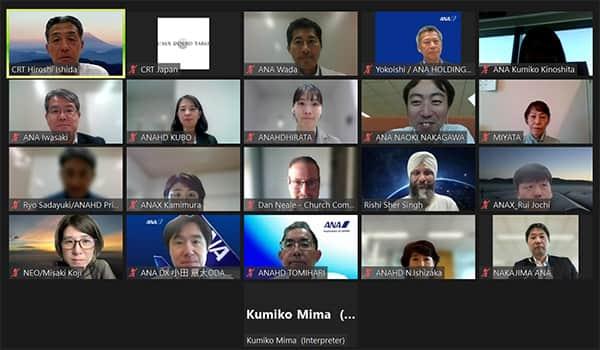Dialogue with Experts on the AI and Human Rights
Major Activities in FY2024
Dialogue with Experts on the AI and Human Rights
On May 29, 2024, we held an online dialogue with experts on AI. Experts gave their opinions on the latest global trends in the utilization and governance of AI that incorporate a human rights perspective, and how we should promote our efforts for respect for human rights.

Theme: Utilization and governance of AI based on "AI and Human Rights”
Date and Time: May 29, 2024, 15:00-17:00
Experts
- Daniel Neale, Responsible Investment-Social Themes Lead- at Church of Commissioners for England
- Rishi Sher Singh, Adviser at Caux Round Table Japan
General Coordination
Caux Round Table Japan
Hiroshi Ishida (Executive Director)
ANA HOLDINGS INC.
Chikako Miyata (Executive Vice President, Director of Corporate Sustainability), and others
Summary of opinions from experts
- Responsible AI = responsible business. “Responsible business” is important from the perspective of long-term value creation, respect for human rights, promotion of the SDGs, and a fair society. It is not only indispensable for social stabilization but a social driver that provides equity. In order to continue responsible business, responsible corporate behavior with AI is indispensable.
- Since AI involves many things developing at the same time, including regulation, speedy progress, integration with existing technologies, etc., it is difficult to have a complete picture of AI covering all the information. AI-related legislation is on the rise. The United Nations announced the first ever global consensus on AI ethics by 193 countries. While there is still no global framework for AI regulation, there is responsible corporate behavior. It is important to incorporate this concept into AI and, as with human rights, to firmly ascertain the consequences and impacts of actions and decisions taken by enterprises, as well as to respond seriously to issues, if any, related to human rights.
- There are several prominent AI-related human rights risks. Some of them involve privacy, and they could have major consequences, such as discrimination and loss of job and livelihood. AI affects many people and the extent of its impact is great. For example, technology such as image recognition allows profiling of personal attributes, including of minorities, based on physical and religious characteristics, but such identification of persons can be risky. Employee monitoring within the company can also be a risk from a human rights perspective.
- We recognize that AI utilization has a significant impact on the airline industry. I personally recognize that the airline industry is facing difficulties due to cost pressures, but there is potential for cost optimization, revenue management, predictive maintenance, and CO2 emission reduction through the use of technology. It is important to prioritize the impact of business activities and keep an eye on the areas where the impact is greater. There is a prioritization process in the United Nations' Guiding Principles on Business and Human Rights (UNGPs), and I believe that this prioritization process should be used for AI-related impacts and risks, even on an experimental basis through human rights due diligence.
- AI is involved in many areas and has become a part of our lives. It is necessary to confirm where AI-related ethical issues lie. It is necessary to think what responsible AI will be. It is important to develop a process for risk and impact assessment, implement it in the course of business activities, and at the same time check what is happening now. Furthermore, it is important to determine how to continuously check what is happening now and keep up with the speed of fast-evolving and advancing AI. It also requires strong governance and accountability. It is crucial whether this can be developed in accordance with the principles of human rights due diligence.